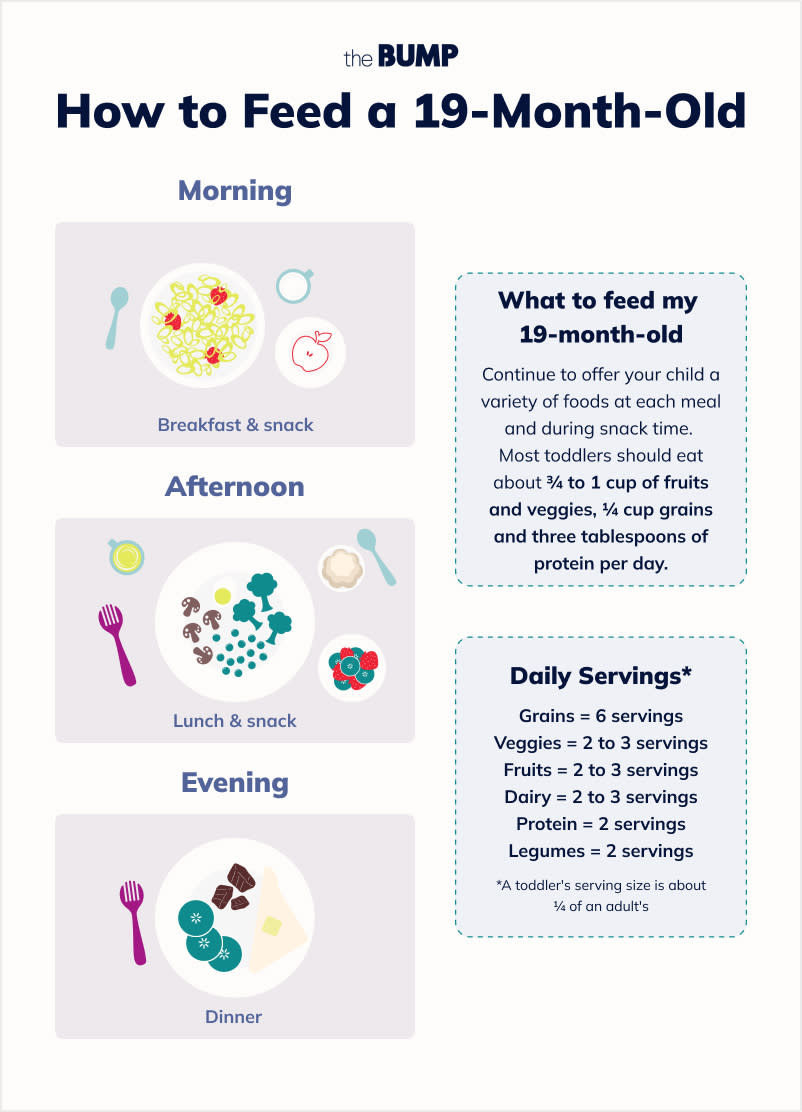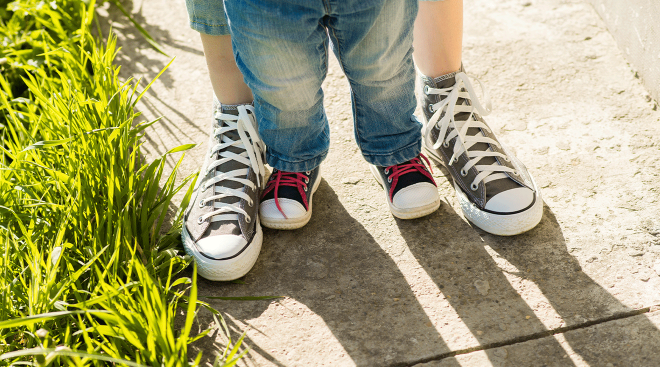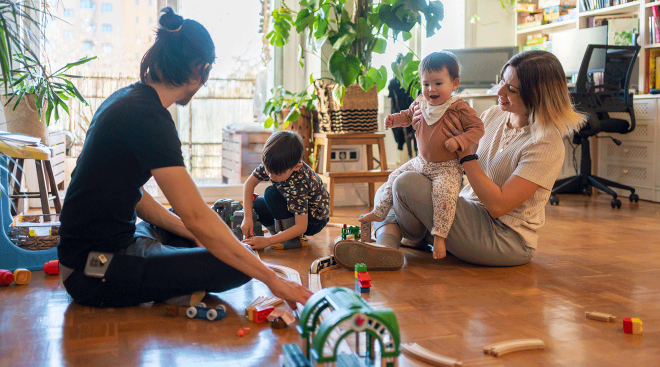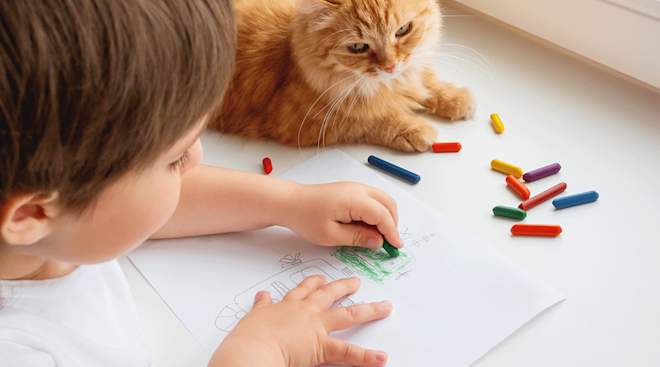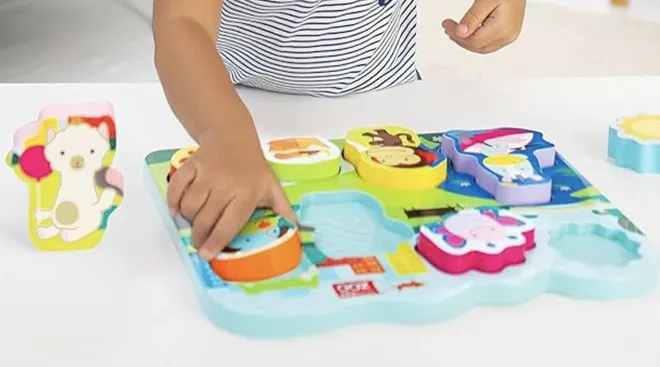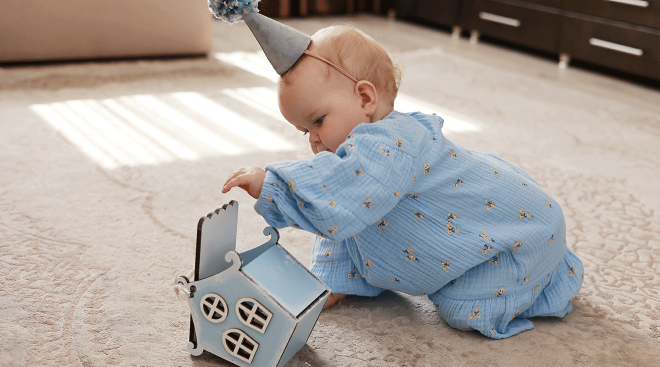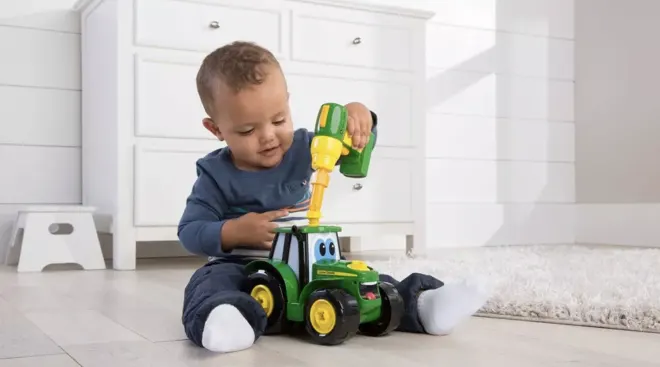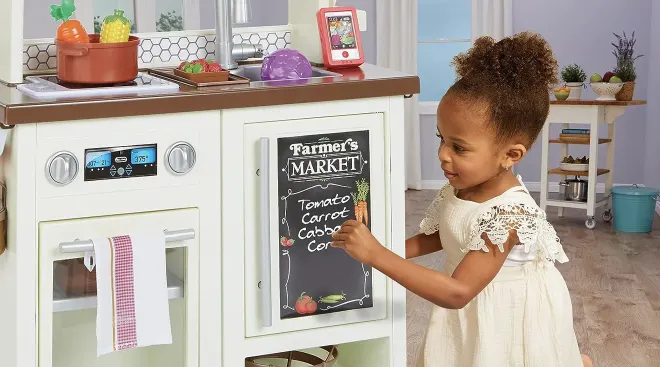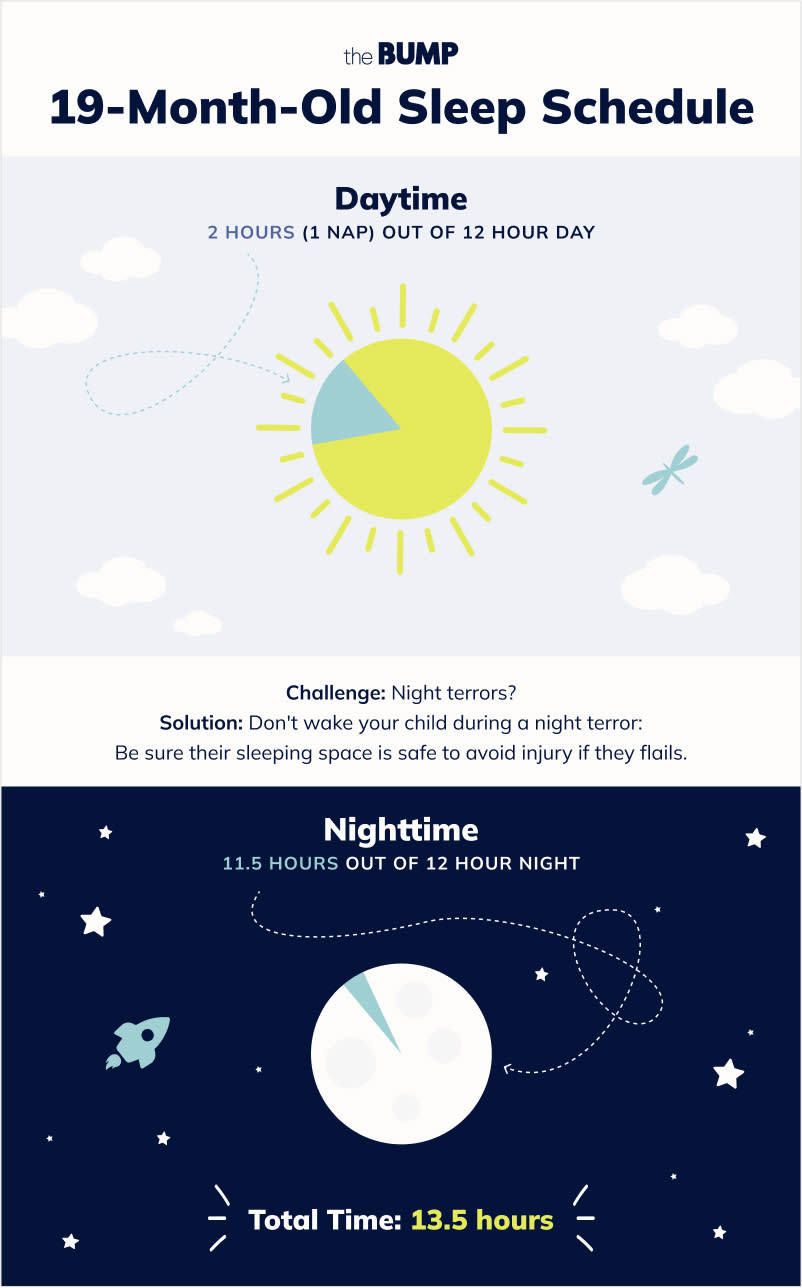Wow, baby is officially more than a year and half old now, and we bet they’re keeping you on your toes! It seems you embark on a new adventure every day as your 19-month-old baby is likely running around, learning new words and maybe starting to throw a tantrum or two. What else is on the list of 19-month old milestones? Keep reading for more about developmental markers, sleep schedules, feeding routines and more.
You're probably amazed at how fast your child is learning and mastering skills. And you're seeing their personality in all the new feats they're performing. Is your child daring or careful? It's getting more obvious as their personality shines through.
19-month-old weight and height
Average 19-month-old baby weight is 23.9 pounds for a girl and 24.6 pounds for a boy, according to the World Health Organization. How tall should a 19-month-old be? Average height is 32.2 inches for a girl and 32.8 inches for a boy.
19-month-old milestones
A lot of parents ask, “What should my 19-month-old be doing?” Here are some 19-month-old milestones they may have hit or are working on:
- Walking. Your toddler can probably run, climb and bend over to pick up a toy from a standing position.
- Speech. Your little chatterbox might be able to say 10 to 20 words. If they can't, it may not be cause for concern, but it's worth bringing up to the pediatrician. One common cause for a speech delay is trouble hearing.
- Teething. Watch out for teething discomfort, as the upper cuspids (canine teeth) and lower first molars tend to break through around this time.
- Potty Training. Keep talking up the potty and read a few board books (see our favorite ones here) about potty training to psych up your 19-month-old for this upcoming milestone.
19-month-old behavior
Your 19-month-old may be exhibiting some challenging and encouraging behaviors. Tap below for advice on dealing with:
- Tantrums. Feel like you're already in the terrible twos even though your child isn't 2 yet? Totally normal. Nineteen-month-olds are still learning to communicate and regulate their emotions. These skills will take some time to develop. Give your child TLC when they're upset, and try to help them get their point across when they're frustrated.
- Separation anxiety. At this age, your kid might become more aware of being away from you and may make a scene—especially if they're hungry, tired or sick. Though it's tempting to linger at daycare drop-off, it's best to make goodbyes quick and stick with a routine. Reassure your child you'll be back and be specific about when.
- Manners. If you lead by example, your child may pick up basic manners. This generally comes in the form of words like “peas,” “tankoo” and “scoosme.”
- Social skills. Sharing and playing cooperatively with others may still be a challenge, but you can help by praising positive behavior.
A trip to the pediatrician is common for a 19-month-old if you missed the 18-month visit. Here are some health questions parents have at this age:
- My 19-month-old has diarrhea. What should I do?
- What should I do about constipation in my 19-month-old?
- My 19-month-old has a fever. What should I do?
- My 19-month-old is coughing. What should I do?
- My 19-month-old baby is vomiting. What should I do?
Your 19-month-old is getting more independent with eating—and possibly with refusing food too.
How much should my 19-month-old eat and drink?
One- to-2-year-olds should be eating much like you do: three or four meals per day, plus two snacks.
About three 8-ounce cups of whole milk per day is recommended for a 19-month-old, if they don't get calcium from other foods. Aim for about 700 mg of calcium total per day.
If you're weaning a 19-month-old from breastfeeding, remember to go slow. Drop one daily nursing session for at least three to seven days before dropping the next. If you go too fast, you could risk plugged milk ducts and infection. Plus, it's a transition that could have an emotional impact on your child, so they may need a little extra comfort while weaning.
What to feed my 19-month-old
Continue to offer your child a variety of foods at each meal and during snack time. Most toddlers should eat about ¾ to 1 cup of fruits and veggies, 1½ cups of grains and four tablespoons of protein per day.
Looking for some tasty and nutritious meal inspiration? Check out these food ideas for a 19-month-old:
19-month-old feeding schedule
19-month-old won’t eat
Toddlerhood is known for picky eating, so try not to worry too much if your child has been turning down nutritious foods and eating what seems like half a bite for dinner. They're not growing as quickly as they did in their first year, and let's face it, saying “no” to eating is part of exercising their newfound independence. The best you can do is to keep offering nutritious food options, choosing and preparing food together and modeling healthy eating behaviors for your child. Pressuring them to eat their broccoli simply won't work.
A sleep routine is key for a 19-month-old. Getting plenty of sleep is important to your child's development and mood. Having a set routine will help your child learn how to wind down at bedtime and, hopefully, prevent bedtime battles.
How much sleep does a 19-month-old need?
Most 19-month-olds need around 11 to 12 hours of nighttime sleep, plus a nap of about 1.5 to 3 hours, for a total of 13 to 14 hours of sleep per day. Every kid is different, but your child's schedule may look something like this:
19-month-old not sleeping at night
There are two common sleep troubles parents can have with 19-month-olds: One is that they don't seem to want to go to bed at bedtime. This is because everything you’re doing seems much more fun than sleeping. But your tot does need to snooze (and you need the quiet time too), so make sure to stick to the same calming bedtime routine—and start it at the same time each night.
The other common predicament is that they're waking up during the night, either calling for you or coming into your bedroom. To prevent this, it's important your child learns to fall asleep on their own, without special soothers or a parent to cuddle with. That way, when they wake in the middle of the night, they'll know how to put themself back to sleep without needing your help.
To help teach this skill, try to cut down on trips to your child's room and/or don't let your child come into your bed in the middle of the night. (If they do, bring them back to their own bed immediately.) All these strategies can establish nighttime rules and promote a good night’s sleep for a toddler (and for you too).
Night terrors in 19-month-olds
A 19-month-old waking up screaming at night might be having a night terror. A night terror is defined as a crying or screaming episode where the child never really wakes and so is unresponsive. Don't try to wake your child during a night terror, just do your best to calm them back to sleep. And be sure their sleeping space is safe to avoid injury if they flail or walk around. The good news is these seemingly wild sleep disruptions are only upsetting for you. Kids don't even remember them! And they usually grow out of having them by age 13. There's no known cause of night terrors, but stress, changes in routine and overtiredness can contribute to them. So try to stick to a calming bedtime routine, and put your child to bed early enough so they can get a full night's rest.
As your child learns and develops new skills, incorporate them into the playtime you have together. Looking for things to do with a 19-month-old? Some fun activities, games and toys for a 19-month-old include:
- Playing soccer. Your tot is developing their kicking skills.
- Going to the park. They'll love practicing climbing skills on young child-friendly equipment.
- Caring for a baby doll. 19-month-olds start to imitate actions they see their parents do, like holding and feeding a baby.
- Playing with puppets. The imaginative play is a learning experience for your child.
- Drawing or scribbling. Give your 19-month old baby some crayons or markers and let them begin making their own masterpieces.
- Reading. It’s extremely important to continue reading to baby. By now, they’ll likely have some favorite stories and will follow along with you.
Should a 19-month old watch TV? At this age, it might be tempting to start letting your little one get screen time—because they want to do exactly what they see their parents doing. Just because you can choose between Mickey, Paw Patrol and 10,000 other toddler shows doesn’t mean you should let your child tune in 24/7.
In fact—brace yourself—doctors say children 18 to 24 months should get less than an hour of screen time a day. That hour should ideally be on an education-based program, and you should talk about it with your child. The reason is development: It’s too easy for a toddler to zone out in the presence of TV instead of being stimulated by new experiences, and at this age, it's difficult for them to understand what's happening on the screen and how that relates to the real world.
- Take your toddler to their 18-month check-up, if you haven’t already.
- Encourage your child to undress themself. This is a good skill to develop at this age, and you'll see the benefits once you have one less task you need to help with.
- Bring your own books and playthings to the doctor's office or restaurant to keep your child occupied while you wait. These places often have crayons or toys, but you'll want to have as much backup as possible. Remember, you’ll want to avoid getting into the habit of placing your 19-month old baby in front of a screen during these situations.
- Air travel? Assess your kid before accepting the offer to board early. Some toddlers do need the extra time to get settled, but others do better with as little time as possible in a confined plane.
- Don't give a toddler who's already emotional a long lecture about what they've done wrong—their brains can’t process a lesson when they’re in tantrum mode. Tell them the rules, let the outburst subside and then move on to what's next.
- Are you bilingual? Now is a great time to begin introducing your language to baby. Use both languages around them and they’ll soon begin making the connections.
- Is your tot exhibiting aggressive behavior like hitting or biting? Don’t stress too much—this is normal for toddlers at this stage as they navigate ways to process and express strong emotions. Look into ways to address and discourage your child from using aggression.
- If you have a picky eater on your hands, don’t fret. It’s not unusual for 19-month-olds to stick to what they like. Continue to provide nutritious foods, offering some “safe” foods you know your child loves as well as new foods that’ll expand their palates.
It’s beyond exciting to watch your child meet their 19-month-old milestones. In the coming months, you can likely look forward to your tot stringing words together to form basic sentences and naming familiar people and objects. But remember, every child progresses at their own speed. If you’re ever concerned about your toddler’s development, don’t hesitate to speak with your pediatrician.
Please note: The Bump and the materials and information it contains are not intended to, and do not constitute, medical or other health advice or diagnosis and should not be used as such. You should always consult with a qualified physician or health professional about your specific circumstances.
Navigate forward to interact with the calendar and select a date. Press the question mark key to get the keyboard shortcuts for changing dates.


































